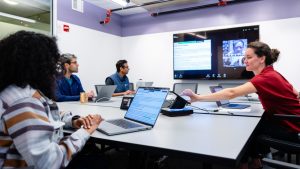Argonne Training Series Helps Prepare a New Generation of AI-Ready Researchers
Dec. 19, 2024 -- Equipping students with the skills to effectively use artificial intelligence (AI) is key to unlocking its full potential for accelerating future scientific breakthroughs.

ALCF education outreach lead Paige Kinsley (far right) kicks off an AI training session with ALCF colleagues Shilpika, Archit Vasan and Venkat Vishwanath (left to right). Image credit: Argonne National Laboratory.
With its annual “Intro to AI-driven Science on Supercomputers” training series, the U.S. Department of Energy’s (DOE) Argonne National Laboratory is preparing a new generation of researchers to harness the power of AI and high performance computing (HPC) for science. Aimed at undergraduate and graduate students across the United States, the virtual training program has hosted over 700 participants since its launch in 2021.
“Our training series is empowering students with the skills and knowledge needed to use AI to drive new discoveries,” said Paige Kinsley, education outreach lead at the Argonne Leadership Computing Facility (ALCF). “The goal is to provide a launchpad for attendees to explore different career opportunities and pursue innovative ways to employ AI in their research.”
This year, the series was promoted through the National Artificial Intelligence Research Resource (NAIRR) Pilot. Launched by the National Science Foundation, in collaboration with DOE and several partner organizations, the NAIRR Pilot includes a “Classroom” focus area that aims to engage new communities through AI education, training, user support, and outreach.
“By contributing to the NAIRR Classroom, we’re able to reach more students and provide them with a strong foundation in AI to help them excel in this rapidly advancing field,” Kinsley said.
Organized and taught by ALCF staff, the 2024 program recently concluded with a seven-part series that covered topics such as large language models, neural networks, and model training. Attendees were able to gain hands-on experience with ALCF’s HPC resources, including the Polaris supercomputer and the ALCF AI Testbed. The ALCF is a DOE Office of Science user facility.
For participants like Jennifer Coburn, a graduate student at the University of Tennessee, the series offered a valuable opportunity to enhance her AI skills.
“I’m currently pursuing a master’s degree in computer science with a focus on machine learning, so this series has definitely given me a jump start in the field,” she said.
Coburn recently completed an internship at Argonne focused on developing AI tools to aid with tasks related to intellectual property law. In 2025, she will begin a new internship with Argonne’s Computational Science division, where she will work with a research team to develop large language models for cosmology using a combination of simulated and observational data.
While Coburn has some experience working with AI tools, she had limited exposure to supercomputing resources before attending the training series.
“My upcoming internship requires knowledge of HPC,” she said. “I didn’t think I would be able to get that kind of training at my university, so when I found out about the ALCF series, it was a no-brainer.”
It was eye-opening for Coburn to see how much more effectively AI models performed on Argonne's large-scale systems compared to the personal computers she had previously used in her research. She also found the guidance on prompt engineering particularly helpful.
“Learning best practices for prompt engineering is something that will impact my work moving forward,” Coburn said. “Before, I was basically guessing at how to get models to produce the output I was looking for. Now, I’m able to get them to generate more relevant and accurate results.”
Although the series is aimed at college students, it is open to anyone who wants to gain experience using AI in science – even high schoolers like Kevin Fang. A junior from Stratford Preparatory High School in California, Fang attended the series to expand his knowledge of large language models and to experiment with model training using GPU-powered machines like Polaris and novel accelerators like the ALCF AI Testbed’s Groq and SambaNova systems.
“My biggest takeaways were gaining a better understanding of AI models, their applications, and how researchers approach training them,” he said. “The hands-on sessions taught me practical workflows, and the exposure to parallel training and AI testbed systems gave me a deeper understanding of optimizing AI workloads in HPC environments.”
Fang came into the training series with real-world experience using AI for science, having completed an internship at DOE’s Lawrence Berkeley National Laboratory. In this role, he worked with a team to employ AI and machine learning models to process protein crystallography data for the Berkeley Center of Structural Biology. During Argonne’s training series, Fang discovered that the cutting-edge techniques he learned could help further enhance the models used in his internship.
“Attending the training series solidified my interest in applying AI to scientific research even more,” he said. “It also gave me valuable insights into collaborative research environments and how they function, which will impact my future career path.”
To broaden the reach of the ALCF AI training series, materials and videos from each session are available on the event webpage, as well as GitHub and YouTube.
Source: Jim Collins, Argonne











